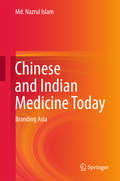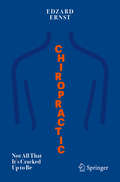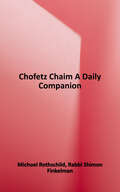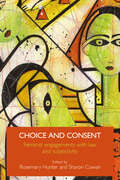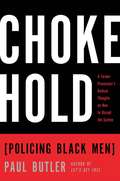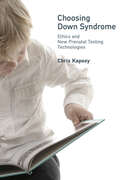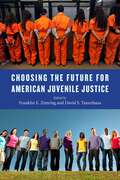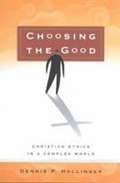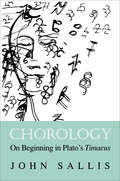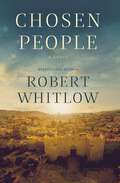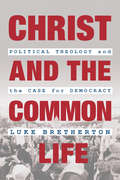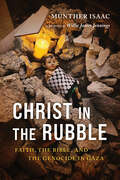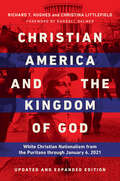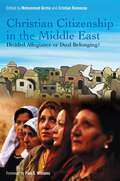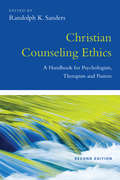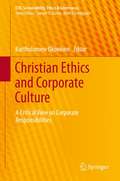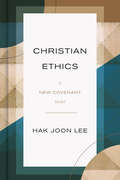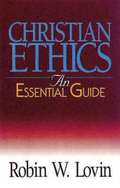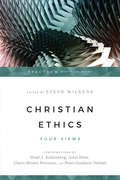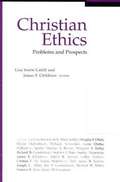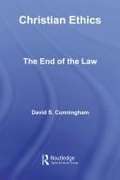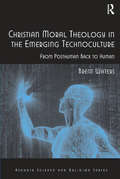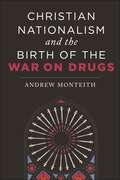- Table View
- List View
Chinese and Indian Medicine Today: Branding Asia
by Md. Nazrul IslamThis book discusses Asian medicine, which puts enormous emphasis on prevention and preservation of health, and examines how, in recent decades, medical schools in Asia have been increasingly shifting toward a curative approach. It offers an ethnographic investigation of the scenarios in China and India and finds that modern students and graduates in these countries perceive Asian medicine to be as important as Western medicine. There is a growing tendency to integrate Asian medicine with Western medical thought in the academic curriculum that has led to a gradual decline of Asian medical thought and practices. At the same time, there has been a massive rise in patent drugs, health products and cosmetics being sold under the brand names of Asian medicine or herbal medicine. Most of these drugs and health products do not follow the classical formulas found in the Asian medical texts. The book analyses these texts and concludes that contemporary Asian medicine rarely follows the classical texts, and in fact uses Asian medicine brands to sell Western health products and practices.With a particular focus on the formal and professional sector of Chinese herbal medicine and Indian ayurvedic medicine in urban areas, this book appeals to a broad readership, including undergraduate students and academics as well as non-experts.Md. Nazrul Islam is an Associate Professor in the General Education Office, United International College, Beijing Normal University-Hong Kong Baptist University. He was a Visiting Associate Professor in the School of Population and Public Health, University of British Columbia (2015-16) during which time he completed this book manuscript.
Chiropractic: Not All That It's Cracked Up to Be
by Edzard ErnstOf all forms of alternative medicine, chiropractic is the one that is most generally accepted. In the UK, for instance, chiropractors are regulated by statute and even have their own ‘Royal College of Chiropractic’. In the US, chiropractic’s country of origin, most chiropractors carry the title ‘doctor’ and many consumers believe they are medically trained. Despite this high level of acceptance, chiropractic is wide open to criticism. The claims and assumptions made by chiropractors are far from evidence based. Chiropractic manipulations are of doubtful effectiveness and have regularly been associated with severe adverse effects, including multiple fatalities. The advice issued by chiropractors to patients and consumers is often less than responsible. The behaviour of chiropractors and their organisations is frequently less than professional. This book presents and discusses recent evidence in and around chiropractic in a factual and unemotional manner. It amounts to an evidence-based critique of this profession and discloses the often dangerously misleading information published for the lay audience. It thereby contributes to advancing public health and critical thinking.
Chofetz Chaim: The Concepts and Laws of Proper Speech as Formulated by Sefer Chofetz Chaim (Artscroll Ser.)
by Michoel Rothschild Rabbi Shimon FinkelmanStudy Sefer Chofetz Chaim in 128 daily segments, according to the schedule established by the venerable Manchester Rosh Yeshivah, Rabbi Yehudah Zev Segal, ztl. The Chofetz Chaim's influence continues to grow, as thousands upon thousands adopt his message that the tongue can be a priceless tool or a lethal weapon. And this volume will lead you through his classic work according to the order he set down. It is another vital gift to those who wish to guard their tongues but want to know how. Whether as a study companion or standing on its own, this work is a superbly wrought guide of the laws of proper speech as the Chofetz Chaim himself set them down. SPECIAL SUPPLEMENT: What you must say, what you shouldn't say A Halachic guide to getting and giving information for shidduchim. By Rabbi M. M. Lowy
Choice and Consent: Feminist Engagements with Law and Subjectivity
by Rosemary Hunter Sharon CowanThis current and timely volume presents new thinking and new directions in feminist legal scholarship. Rethinking key concepts in legal feminism, Cowan and Hunter provide a unique examination of key socio-legal concepts in law, jurisprudence and legal and political theory. Written by an international cast of contributors, offering different cultural perspectives as well as doctrinal and theoretical knowledge, this collection of essays presents a dialogue between different feminist positions and approaches to a common theme. It addresses a range of questions, including: Can 'consent' be rethought and infused with different meanings in a post-liberal feminist politics? Can the concepts of 'choice' and 'consent' have consistent meanings and functions between different areas of law, or whether they prove to be highly contingent when viewed across the broad field of law. Exploring the deeply gendered concepts of ‘choice’ and ‘consent’ and examining the philosophical and jurisprudential issues surrounding them as well as how ‘choice’ and ‘consent’ operate in particular areas of law, including criminal law, medical law, constitutional law, employment law, family law and civil procedure, this volume is a key resource for postgraduate law students studying jurisprudence.
Chokehold: Policing Black Men
by Paul ButlerWith the eloquence of Ta-Nehisi Coates and the persuasive research of Michelle Alexander, a former federal prosecutor explains how the system really works, and how to disrupt it. Cops, politicians, and ordinary people are afraid of black men. The result is the Chokehold: laws and practices that treat every African American man like a thug. In this explosive new book, an African American former federal prosecutor shows that the system is working exactly the way it's supposed to. Black men are always under watch, and police violence is widespread - all with the support of judges and politicians. In his no-holds-barred style, Butler, whose scholarship has been featured on 60 Minutes, uses new data to demonstrate that white men commit the majority of violent crime in the United States. For example, a white woman is ten times more likely to be raped by a white male acquaintance than be the victim of a violent crime perpetrated by a black man. Butler also frankly discusses the problem
Choosing Down Syndrome: Ethics and New Prenatal Testing Technologies (Basic Bioethics)
by Chris KaposyAn argument that more people should have children with Down syndrome, written from a pro-choice, disability-positive perspective.The rate at which parents choose to terminate a pregnancy when prenatal tests indicate that the fetus has Down syndrome is between 60 and 90 percent. In Choosing Down Syndrome, Chris Kaposy offers a carefully reasoned ethical argument in favor of choosing to have such a child. Arguing from a pro-choice, disability-positive perspective, Kaposy makes the case that there is a common social bias against cognitive disability that influences decisions about prenatal testing and terminating pregnancies, and that more people should resist this bias by having children with Down syndrome.Drawing on accounts by parents of children with Down syndrome, and arguing for their objectivity, Kaposy finds that these parents see themselves and their families as having benefitted from having a child with Down syndrome. To counter those who might characterize these accounts as based on self-deception or expressing adaptive preference, Kaposy cites supporting evidence, including divorce rates and observational studies showing that families including children with Down syndrome typically function well. Himself the father of a child with Down syndrome, Kaposy argues that cognitive disability associated with Down syndrome does not lead to diminished well-being. He argues further that parental expectations are influenced by neoliberal ideologies that unduly focus on the supposed diminished economic potential of a person with Down syndrome.Kaposy does not advocate restricting access to abortion or prenatal testing for Down syndrome, and he does not argue that it is ethically mandatory in all cases to give birth to a child with Down syndrome. People should be free to make important decisions based on their values. Kaposy's argument shows that it may be consistent with their values to welcome a child with Down syndrome into the family.
Choosing the Future for American Juvenile Justice (Youth, Crime, and Justice #5)
by Franklin E. Zimring and David S. TanenhausThisis a hopeful but complicated era for those with ambitions to reform thejuvenile courts and youth-serving public institutions in the United States. As advocates plea for major reforms, many fear the public backlash inmaking dramatic changes. Choosing the Future for American Juvenile Justiceprovides a look at the recent trends in juvenile justice as well as suggestionsfor reforms and policy changes in the future. Should youth be treated as adultswhen they break the law? How can youth be deterred from crime? What factorsshould be considered in how youth are punished?What role should the police have in schools?This essential volume, edited by two of the leadingscholars on juvenile justice, and with contributors who are among the keyexperts on each issue, the volume focuses on the most pressing issues of theday: the impact of neuroscience on our understanding of brain development andsubsequent sentencing, the relationship of schools and the police, the issue ofthe school-to-prison pipeline, the impact of immigration, the privacy of juvenile records, and the need for nationalpolicies—including registration requirements--for juvenile sex offenders. Choosingthe Future for American Juvenile Justice is not only a timely collection, basedon the most current research, but also a forward-thinking volume thatanticipates the needs for substantive and future changes in juvenile justice.
Choosing the Good: Christian Ethics in a Complex World
by Dennis P. HollingerThe following quotation is taken from the back cover of the book: "The vexing complexities of our modern world often generate cynicism or even despair in the face of moral decision making. Choosing the Good proposes a framework for doing ethics with confident humility, despite the cultural context undermining such endeavors." This book accomplishes two goals in that it provides a survey of essential issues salient for reflection on the moral life and Christian ethics and argues for a particular approach to doing ethics. Dennis Hollinger provides a survey of perspectives, suggesting that an effective Christian ethic must have its basis in a Christian worldview. He examines the complexities of our pluralistic and postmodern society, reflects on factors that influence Christian ethical decisions, and surveys the questions of justice, pluralism, and Christian influence in the secular world." The author provides extensive documentation for the material presented in the book.
Chorology: On Beginning in Plato's Timaeus (The\collected Writings Of John Sallis Ser. #I, 11)
by John Sallis“The major American philosopher . . . makes us want to re-read the Platonic text with fascination. And that is but its grandest gift.” —Daniel Guerriere, professor emeritus of philosophy at California State University, Long BeachIn Chorology, John Sallis takes up one of the most enigmatic discourses in the history of philosophy. Plato’s discourse on the chora—the chorology—forms the pivotal moment in the Timaeus. The implications of the chorology are momentous and communicate with many of the most decisive issues in contemporary philosophical discussions.“This excellent work . . . deserves the serious consideration of all who are interested in contemporary philosophy as well as those who concern themselves with ancient philosophy, especially Plato.” —Review of Metaphysics
Chosen People: Chosen People And Promised Land (A\chosen People Novel Ser. #2)
by Robert WhitlowBestselling author Robert Whitlow returns with an international legal drama that speaks to critical issues of our day.“Compelling, realistic, and inspiring.” —Randy Singer, bestselling author of Rule of Law“You are a chosen people, a royal priesthood, a holy nation . . .”During a terrorist attack near the Western Wall in Jerusalem, a courageous mother sacrifices her life to save her four-year-old daughter, leaving behind a grieving husband and a motherless child.Hana Abboud, a Christian Arab Israeli lawyer trained at Hebrew University, typically uses her language skills to represent international clients for an Atlanta law firm. When her boss is contacted by Jakob Brodsky, a young Jewish lawyer pursuing a lawsuit on behalf of the woman’s family under the US Anti-Terrorism laws, he calls on Hana’s expertise to take point on the case. After careful prayer, she joins forces with Jakob, and they quickly realize the need to bring in a third member for their team, an Arab investigator named Daud Hasan, based in Israel.To unravel the case, this team of investigators travels from the streets of Atlanta to the alleys of Jerusalem, a world where hidden motives thrive, the risk of death is real, and the search for truth has many faces. What they uncover will forever change their understanding of justice, heritage, and what it means to be chosen for a greater purpose.
Christ and the Common Life: Political Theology and the Case for Democracy
by Luke BrethertonIn Christ and the Common Life Luke Bretherton provides an introduction to historical and contemporary theological reflection on politics and opens up a compelling vision for a Christian commitment to democracy.In dialogue with Scripture and various traditions, Bretherton examines the dynamic relationship between who we are in relation to God and who we are as moral and political animals. He addresses fundamental political questions about poverty and injustice, forming a common life with strangers, and handling power constructively. And through his analysis of debates concerning, among other things, race, class, economics, the environment, and interfaith relations, he develops an innovative political theology of democracy as a way through which Christians can speak and act faithfully within our current context.Read as a whole, or as stand-alone chapters, the book guides readers through the political landscape and identifies the primary vocabulary, ideas, and schools of thought that shape Christian reflection on politics in the West. Ideal for the classroom, Christ and the Common Life equips students to understand politics and its positive and negative role in fostering neighbor love.
Christ and the Common Life: Political Theology and the Case for Democracy
by Luke BrethertonIn Christ and the Common Life Luke Bretherton provides an introduction to historical and contemporary theological reflection on politics and opens up a compelling vision for a Christian commitment to democracy.In dialogue with Scripture and various traditions, Bretherton examines the dynamic relationship between who we are in relation to God and who we are as moral and political animals. He addresses fundamental political questions about poverty and injustice, forming a common life with strangers, and handling power constructively. And through his analysis of debates concerning, among other things, race, class, economics, the environment, and interfaith relations, he develops an innovative political theology of democracy as a way through which Christians can speak and act faithfully within our current context.Read as a whole, or as stand-alone chapters, the book guides readers through the political landscape and identifies the primary vocabulary, ideas, and schools of thought that shape Christian reflection on politics in the West. Ideal for the classroom, Christ and the Common Life equips students to understand politics and its positive and negative role in fostering neighbor love.
Christ in the Rubble: Faith, the Bible, and the Genocide in Gaza
by Munther IsaacA cry from the heart and a call to action from a Palestinian Christian pastor and theologian In this impassioned and incisive book, Munther Isaac challenges mainstream Christians&’ uncritical embrace of the modern State of Israel. Speaking from his unique vantage point as a prominent Palestinian Christian pastor and theologian, he proclaims a truth that is rarely acknowledged in Christian circles: Israel&’s campaign to eliminate the Palestinian people did not begin after October 7, 2023. Rather, the campaign is a continuation of a colonial project with nineteenth-century roots that has, since 1948, established systems of entrenched discrimination and segregation worse than South Africa&’s apartheid regime. Writing from Bethlehem with close-up knowledge of conditions on the ground, and rooted in a commitment to nonviolence and just peace, Isaac urges readers to recognize that support for Zionism&’s genocidal project entails a failure to bring a properly Christian theological criticism to bear upon colonialism, racism, and empire. He calls on Christians to repent of their complicity in the destruction of the Palestinian people. And he challenges them to realign their beliefs and actions with Christ—who can be found not among perpetrators of violence, but with victims buried under the rubble of war.
Christian America and the Kingdom of God: White Christian Nationalism from the Puritans through January 6, 2021
by Richard T. Hughes Christina LittlefieldThe myth of a Christian America fuels a powerful political force sure of its moral superiority and intent on implementing a Christian nationalist agenda. Richard T. Hughes and Christina Littlefield draw on discussions of civil religion and forms of nationalism to explore the complex legal and cultural arguments for a Christian America. The authors also provide an in-depth examination of the Bible’s words on the “chosen nation” and “kingdom of God” that Christian nationalists quote to support the idea of the US as a Christian nation. A timely new edition of the acclaimed work, Christian America and the Kingdom of God spotlights how the centuries-long pursuit of a Christian America has bred an aggressive white Christian nationalism that twists faith, unleashes unchristian behavior, and threatens the nation.
Christian Citizenship in the Middle East: Divided Allegiance or Dual Belonging?
by Nigel Biggar Mohammed Girma Ben Ryan Casey Strine Cristian Romocea Issa Diab Najib Awad Paul S. WilliamsFor Christians living as a persecuted minority in the Middle East, the question of whether their allegiance should lie with their faith or with the national communities they live in is a difficult one. This collection of essays aims to reconcile this conflict of allegiance by looking at the biblical vision of citizenship and showing that Christians can live and work as citizens of the state without compromising their beliefs and make a constructive contribution to the life of the countries they live in. The contributors come from a range of prestigious academic and religious posts and provide analysis on a range of issues such as dual nationalism, patriotism and the increase of Islamic fundamentalism. An insightful look into the challenges religious minorities face in countries where they are a minority, these essays provide a peace-building and reconciliatory conclusion for readers to consider.
Christian Counseling Ethics: A Handbook for Psychologists, Therapists and Pastors (CAPS)
by Randolph K. Sanders"For the clients who see us in counseling . . . theological purity will make little difference if we do not practice with ethical integrity." Randolph K. Sanders, from chapter one The work of psychotherapy and counseling is full of ethical challenges and dilemmas. Responding to these situations with wisdom is critical, not only for the professional?s credibility, but also for good therapeutic relationships and positive treatment outcomes. Since its first publication, Christian Counseling Ethics has become a standard reference work for Christian psychologists, counselors and pastors and a key text at Christian universities and seminaries. This thoroughly revised edition retains core material on counseling ethics that has made it so valuable in a variety of settings. Now fully updated, it weighs and assesses new and emerging ethical issues in the field. For example, the current volume explores ethical issues involved in: • multiple relationships • confidentiality • documentation • therapist competence and character • addressing spiritual and value issues in therapy • teletherapy • individual and couples therapy • counseling with minors • psychological first aid after disasters • counseling crossculturally In addition, the book considers dilemmas Christian therapists face in specific settings such as: • church-based counseling centers • government and military institutions • missions organizations • college counseling centers Psychologist Randolph Sanders has assembled a distinguished team of clinicians and academicians to address the issues. They include W. Brad Johnson, Alan Tjeltveit, Everett Worthington, Sally Schwer Canning, Siang-Yang Tan, Tamara Anderson, Stanton Jones, Jennifer Ripley, Angela Sabates, Mark Yarhouse, Richard Butman and Cynthia Eriksson.
Christian Ethics and Corporate Culture: A Critical View on Corporate Responsibilities (CSR, Sustainability, Ethics & Governance)
by Bartholomew OkonkwoThe essays collected in this book discuss the contemporary practice of corporate responsibility by applying the Christian principles of the unity of knowledge and pursuit of truth to the traditional principles of justice, human dignity and the common good, to rediscover a corporate culture that will help transform our economic system and the characteristics required to build an enduring trust in economic relationships. In this volume a select group of management theorists, theologians, legal scholars, economists and ethicists jointly strive to give back to the market economy its ethical and political dimensions. They assess the quality of present day corporate social responsibility, discuss the social and environmental costs of production and argue for an agenda that can be used in modern corporations in their effort to align profitability and growth with business ethics.
Christian Ethics: A New Covenant Model
by Hak Joon LeeIn this capacious and accessible introduction to Christian ethics, Hak Joon Lee advances a renewed vision of Christian life that is liberative, grace-centered, and justice- and peace-oriented in nature. Responding to key ethical questions of today, Lee applies the moral meaning and implications of the New Covenant in Jesus Christ to twenty-first-century life, characterized by fluidity, fragmentation, division, and violence. Christian Ethics begins by introducing covenant as the central drama and storyline of Scripture that culminates in the New Covenant of Jesus. It presents shalom (the wholeness and flourishing of creation) as God&’s ultimate purpose and God&’s covenant as &“God&’s organizing mechanism of community&” that mediates God&’s work of liberation and restoration. Lee proposes a creative model of Christian ethics based on the New Covenant of Jesus and its organizing patterns, reconstructing the key categories of ethics (agency, norms, authority of Scripture, ethical discernment, etc.) and drawing out four practices—communicative engagement, just peacemaking, grassroots organizing, and nonviolence. The result is a new model of Christian ethics that is inclusive, egalitarian, ecological, and justice- and peace-oriented, which overcomes the limitations of traditional covenantal ethics. In the second part of the book, Lee systematically applies New Covenant ethics to the most urgent and controversial social issues of our time: democratic politics, economic ethics, creation care, criminal justice, race, sex and marriage, medicine, and war and peace. Through his deep, pastoral, and irenic inquiries into these difficult topics, Lee demonstrates a pattern of covenantal moral reasoning that undercuts the dominant neoliberal ethos of individualism and transactional relationship that more and more influences Christian moral decisions. His conclusion is that as covenant has been at the heart of modern democracy, human rights, civil society, and civic formation, a renewed understanding of covenant centered in Jesus can help to heal our broken society and imperiled planet, and to reorganize the fragmented human life in the era of globalization and digitization.
Christian Ethics: An Essential Guide (New Studies In Christian Ethics Ser. #20)
by Robin W. LovinIn this excellent outline of Christian ethics, Robin W. Lovin achieves a balance between the questions and issues which form the core of the study of ethics and the life situations from which those questions arise. Eschewing a sectarian approach which dismisses other understandings of the moral life, Lovin nonetheless lays claim to a specifically Christian understanding of ethics. He begins with basic Christian convictions about the reality of God and human redemption and weaves these convictions into the fabric of moral concerns that are widely shared in contemporary society. He takes note of the problems that arise when Christians try to act on or enforce their convictions in a pluralistic society and recognizes the variety of theological and moral beliefs that are held within the Christian community, as well as in the wider society.
Christian Ethics: Four Views (Spectrum Multiview Book Series)
by Steve WilkensChristian Ethics: Four ViewsBrad J. Kallenberg: Virtue EthicsJohn Hare: Divine Command EthicsClaire Peterson: Natural Law EthicsPeter Heltzel: Prophetic EthicsChristian Ethics: Four Views
Christian Ethics: Problems and Prospects
by Lisa S. Cahill James F. ChildressThis fresh analysis of the "state of the question" in religious ethics charts the course for future study and exploration in the field. Written in honor of James Gustafson, who provides a conclusion, these 22 original and tightly argued essays examine hotly debated controversies on a wide range of topics, from sources of theological ethics to the moral life. At the core of these complementary perspectives is the ever-increasing tension between the particularity of religious and philosophical traditions and the universality of moral discourse. Designed for classroom use.
Christian Ethics: The End of the Law
by David S. CunninghamChristian Ethics provides a biblical, historical, philosophical and theological guide to the field of Christian ethics. Prominent theologian David S. Cunningham explores the tradition of 'virtue ethics' in this creative and lively text, which includes literary and musical references as well as key contemporary theological texts and figures. Three parts examine: the nature of human action and the people of God as the 'interpretative community' within which ethical discourse arises the development of a 'virtue ethics' approach, and places this in its Christian context significant issues in contemporary Christian ethics, including the ethics of business and economics, politics, the environment, medicine and sex. This is the essential text for students of all ethics courses in theology, religious studies and philosophy.
Christian Law
by Norman DoeChristian Law: Contemporary Principles offers a detailed comparison of the laws of churches across ten distinct Christian traditions worldwide: Catholic, Orthodox, Anglican, Lutheran, Methodist, Reformed, Presbyterian, United, Congregational and Baptist. From this comparison, Professor Doe proposes that all denominations of the faith share common principles in spite of their doctrinal divisions; and that these principles reveal a concept of 'Christian law' and contribute to a theological understanding of global Christian identity. Adopting a unique interdisciplinary approach, the book provides comprehensive coverage on the sources and purposes of church law, the faithful (lay and ordained), the institutions of church governance, discipline and dispute resolution, doctrine and worship, the rites of passage, ecumenism, property and finance, as well as church, state and society. This is an invaluable resource for lawyers and theologians who are engaged in ecumenical and interfaith dialogue, showing how dogmas may divide but laws link Christians across traditions.
Christian Moral Theology in the Emerging Technoculture: From Posthuman Back to Human (Routledge Science and Religion Series)
by Brent WatersWe are living in an emerging technoculture. Machines and gadgets not only weave the fabric of daily life, but more importantly embody philosophical and religious values which shape the contemporary moral vision-a vision that is often at odds with Christian convictions. This book critically examines those values, and offers a framework for how Christian moral theology should be formed and lived-out within the emerging technoculture. Brent Waters argues that technology represents the principal cultural background against which contemporary Christian moral life is formed. Addressing contemporary ethical and religious issues, this book will be of particular interest to students and scholars exploring the ideas of Heidegger, Nietzsche, Grant, Arendt, and Borgmann.
Christian Nationalism and the Birth of the War on Drugs
by Andrew MonteithRecovers the religious origins of the War on DrugsMany people view the War on Drugs as a contemporary phenomenon invented by the Nixon administration. But as this new book shows, the conflict actually began more than a century before, when American Protestants began the temperance movement and linked drug use with immorality.Christian Nationalism and the Birth of the War on Drugs argues that this early drug war was deeply rooted in Christian impulses. While many scholars understand Prohibition to have been a Protestant undertaking, it is considerably less common to consider the War on Drugs this way, in part because racism has understandably been the focal point of discussions of the drug war. Antidrug activists expressed—and still do express--blatant white supremacist and nativist motives. Yet this book argues that that racism was intertwined with religious impulses. Reformers pursued the “civilizing mission,” a wide-ranging project that sought to protect “child races” from harmful influences while remodeling their cultures to look like Europe and the United States. Most reformers saw Christianity as essential to civilization and missionaries felt that banning drugs would encourage religious conversion and progress. This compelling work of scholarship radically reshapes our understanding of one of the longest and most damaging conflicts in modern American history, making the case that we cannot understand the War on Drugs unless we understand its religious origins.
